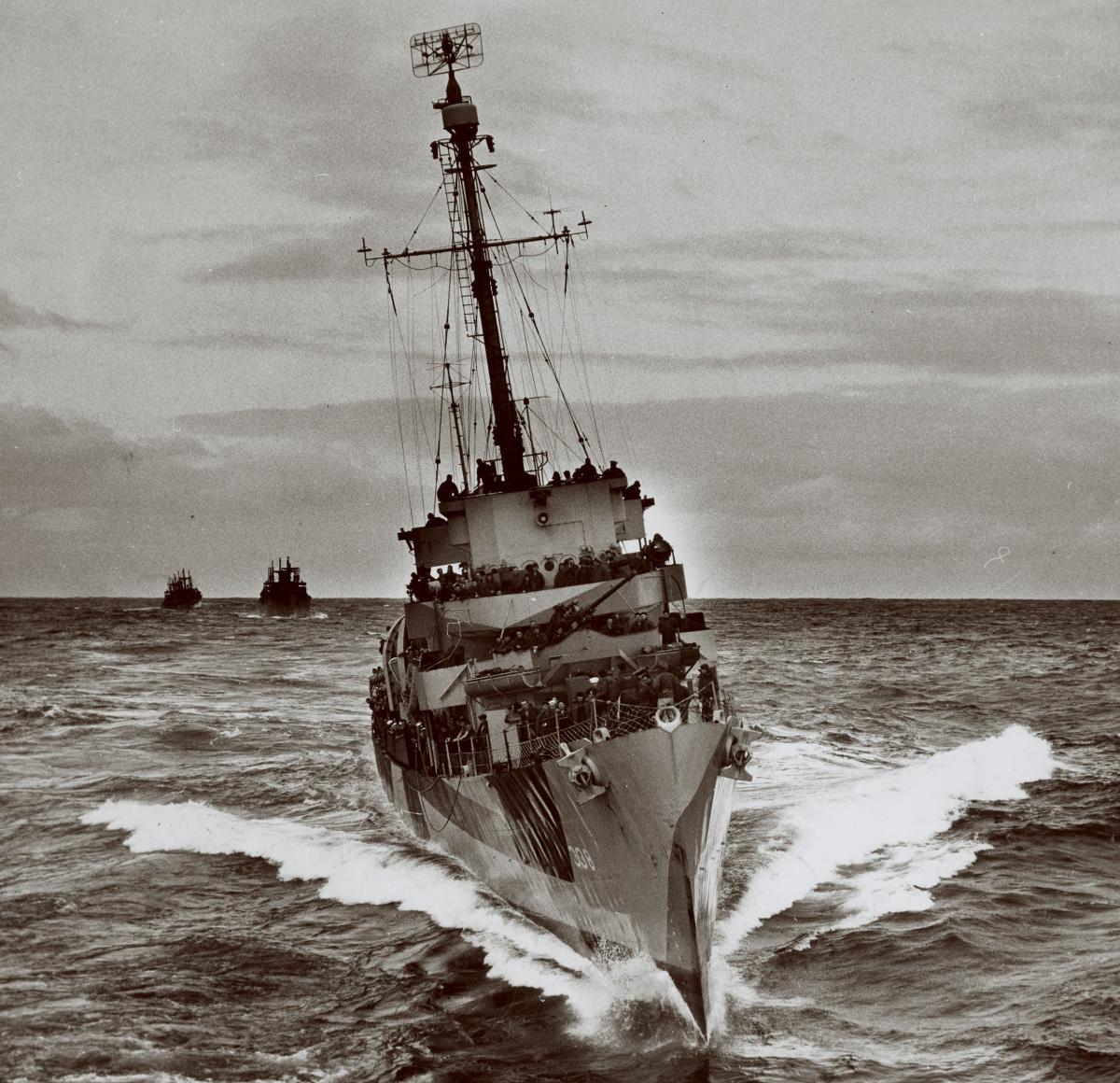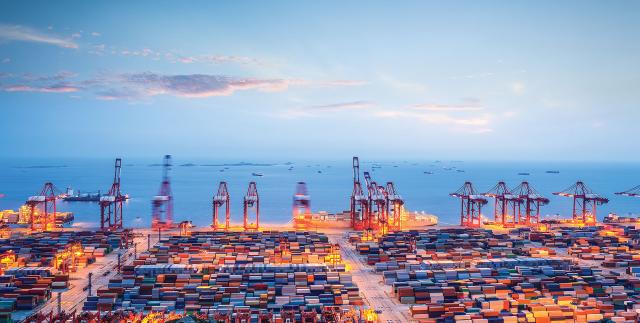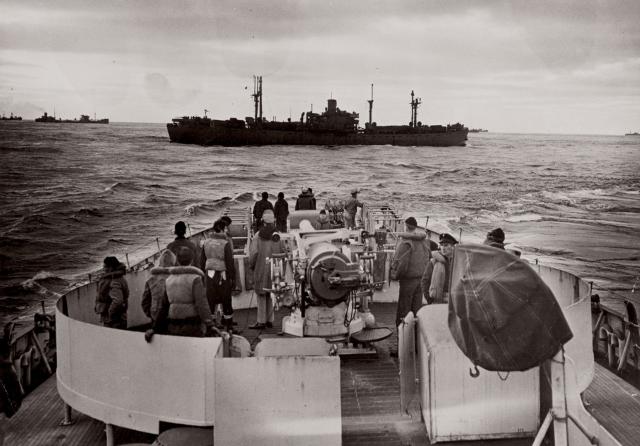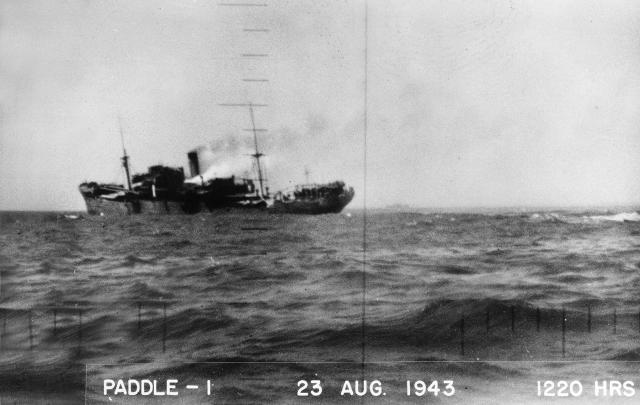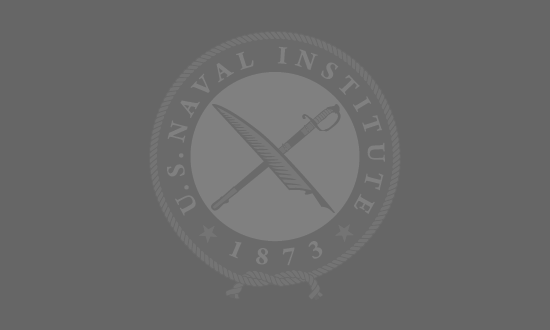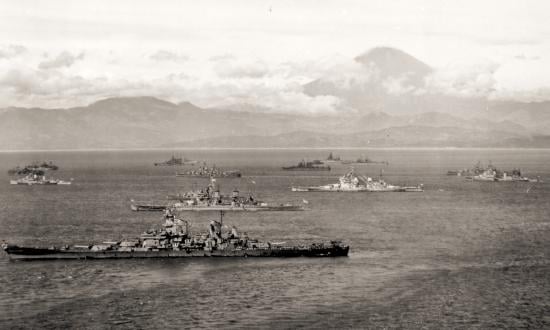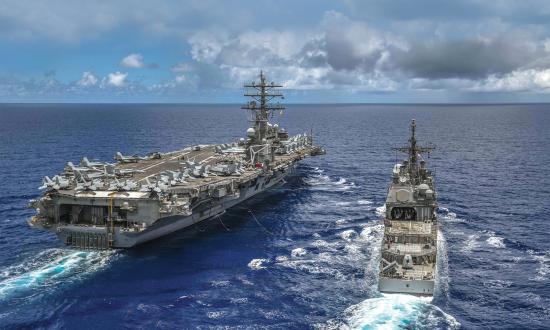Speaking to Congress, the Chief of Naval Operations recently argued that the purpose of the U.S. Navy hinged on the timeless missions of sea control and power projection.1 Perhaps so. But to most people, these phrases raise more questions than they answer. Control at what cost, and to what end? Power to do what, exactly? Projected where and how? Such declarations seem unlikely to induce taxpayers to fork over the enormous sums entailed, especially when so many think the money could be better spent fixing pressing domestic problems. But this is nothing new.
More than a century ago, the patron saint of the U.S. Navy grappled with similar difficulties. Alfred Thayer Mahan faced a U.S. public riven by deep internal disagreement and skeptical of the need to spend scarce public resources on the Navy. Looking back on his career, Mahan considered that one of his greatest achievements was providing “men in civil life” with a coherent answer to a simple but profound question: “Why do we need a Navy?” In his autobiography’s opening chapter, he observed:
Between the day of my entrance into the service, fifty years ago, and the present, nowhere is change more notable than in the matter of atmosphere; of the national attitude towards the navy and comprehension of its office. Then it was accepted without much question as part of the necessary lumber that every adequately organized maritime state carried, along with the rest of a national establishment. Of what use it was, or might be, few cared much to inquire. There was not sufficient interest even to dispute the necessity of its existence.2
The conventional understanding of Mahan is that he persuaded his countrymen through a crude argument about the primacy of the combat battlefleet. While Mahan did make arguments in his earliest work supporting such a characterization, he made others pointing in a very different direction—toward economic pressure, not battle, as the ultimate object of naval force. Over time, combat became ever less pronounced and economics ever more so in his explanation of sea power. Mahan became a pioneering thinker about the importance of naval power in a globalized world economy, as well as of public opinion in shaping national strategic policy. His understanding came to center on the role of naval power in facilitating—or deranging—international trade. Coming to grips with the sophistication of his thinking, especially in his later work, makes him more, not less, relevant for the task today: convincing taxpayers that the Navy performs so vital a mission they must fund it.
Influence
Mahan’s campaign began with the 1890 publication of The Influence of Sea Power upon History: 1660–1783. He provided a novel, systematic, and coherent explanation of the purpose of a navy, covering the generation, employment, and mechanics of applying power at sea to attain national objectives. Peppering the historical narrative with allusions to contemporary issues, he argued that sea power had influenced the course of human history more than any other single factor. As future president Theodore Roosevelt remarked in a review of Mahan for Political Science Quarterly, “It seems almost incredible, when we think of the immense part played by naval power in history, that no historian should ever yet have treated it at length from the philosophic standpoint; yet this is literally the case.”3
Contrary to popular opinion, Influence was not primarily about the employment of naval forces in wartime; rather, it was about the importance of state coordination of national maritime (including naval) resources to achieve relative advantage in both peace and war. Furthermore, the book’s central proposition was fundamentally economic: “Both travel and traffic by water have always been easier and cheaper than by land.” State power, Mahan held, was a function of national wealth, and the generation of wealth derived from commerce. In modern times, the single most valuable font of commercially produced wealth was overseas trade. Following this logic, he reasoned that access to the sea (the “common”) was essential to national well-being; hence the need for a strong navy to guarantee access. Though Mahan spent a further 20 years refining precisely how sea power worked, the core thread of his overall theory remained unaltered. In identifying the interrelationships between trade, wealth, and power, Mahan was the first to articulate a coherent explanation for why states should invest in navies.
On his retirement in November 1896 after 40 years of service, Captain Mahan turned his attention to educating the public and its elected representatives. Having been impressed by the impact of public opinion on strategic decision-making during the Spanish-American War, he wrote:
The study of the Art and History of War is preeminently necessary to men of the profession, but there are reasons which commend it also, suitably presented, to all citizens of our country. Questions connected with war—when resort to war is justifiable, preparation for war, the conduct of war—are questions of national moment, in which each voter—nay, each talker—has an influence for intelligent and adequate action, by the formation of sound public opinion; and public opinion, in operation, constitutes national policy.4
This striking formulation—“public opinion, in operation, constitutes national policy”—concisely expressed Mahan’s understanding of its relationship to the Navy. He wanted his countrymen to better understand that the United States inhabited a dangerous world likely soon to become a good deal more dangerous; that events outside the continental United States impinged on the nation’s general economic security—and its long-term prosperity. Through education, Mahan hoped the electorate would more readily accept the necessity of a strong navy: He tried to show citizens how their navy was essential to protecting their interests. More than most naval officers of any generation, Mahan understood the paramount necessity for naval policy to command not just public assent but also public understanding to obtain the requisite levels of funding.
Mahan undertook his educational campaign at an inflection point in U.S. history. Naval reform remained a contentious political issue throughout the 1890s, provoking disagreement over the precise character and purpose of the force needed, and especially over the funds required. The dispute was so intense because it occurred during a period of social upheaval and economic depression—and against the background of a still more profound debate over the future shape of U.S. society. Simply put, there were competing fiscal demands. Some interests wanted the federal government to invest instead in national infrastructure (or the Panama Canal). Others demanded more generous pensions (especially for Union Civil War veterans). A large number thought the money would be better spent fixing societal problems at home—a down payment on a redistribution of wealth necessary to create a more equitable society. (Sound familiar?) It was an ongoing debate with clear parallels to today. Mahan’s skill was in relating seemingly narrow naval issues to politically important nonnaval ones. That was why he commanded a large audience.
Globalization I
In his later work (which is seldom read), Mahan refined his thinking about sea power. Belying his reputation as a crude apostle of the combat battlefleet, Mahan explored the workings of, and contemporary changes to, the global economic system. Indeed, it is fair to say Mahan was an early student of the late-19th-century economic transformation that today is called the first era of globalization, or Globalization I (the current era being Globalization II).
He made two key insights. First, he perceived that economic systems—old and modern—were intrinsically dynamic: The production of wealth was chiefly a function of the flow of international trade and spin-off commerce, not of raw productive capacity. Second, he saw that the growing interdependencies among national economies had myriad implications for the practical application of sea power. Consider: How can one apply naval pressure effectively if one does not understand the system one is trying to disrupt or control? What if economic pressure points—naval targets—shift as economic systems change?
In parallel, Mahan thought deeply on the changing character of war. As early as 1895, he displayed concern over the brittleness of modern societies—industrialized, urbanized, noisily democratic, and increasingly dependent on access to international trade—and voiced his fear that modern workers would be far less willing than their forebears to tolerate lower standards of living consequent to economic disruption caused by war. This growing brittleness, he realized, had strategic implications.
Although he consistently deprecated guerre de course as incapable of achieving decisive strategic results, he became more and more convinced that systematic commerce destruction, through blockade—economic warfare—was the primary object of sea power. Destruction of the enemy’s battlefleet might be a necessary means to this end, but only a means. Derangement of the enemy’s economy, so as to corrode the stability of its society, was the true end of naval force. In his own words: “The object of a blockade proper is to embarrass the finances of a country by shutting its ports to foreign commerce, thus deranging one main feature of its general markets, and thereby bring confusion into the whole [economy].”5
In 1910, Mahan wrote to The Times (of London) neatly summarizing his latest thinking on this point. Taking aim at a recent article that had argued “that ‘completely disorganizing the conditions of business’ constitutes ‘a pressure of comparatively small importance’ upon a nation at war,” Mahan responded:
I will venture the assertion that historically this is not so; that “complete disorganization of business,” which it is argued will result from the exercise of the right of maritime capture, has always constituted a “very important,” and often—if not always—a decisive “pressure.” To say that the greatness and intricacy of modern industrial and commercial development will cause the pressure hereafter to be greater is reasonably probable, and may safely be prophesized. To bring the pressure of war to bear upon the whole population, and not merely upon the armies in the field, is the very spirit of modern warfare.6
In short, Mahan predicted that major conflict between advanced industrial powers would imperil the highly optimized global economic system that underpinned industrial societies. What is more, in the future, sea power would become even more potent.
While Mahan discerned much on future maritime war, he never explained what would be necessary to make what we could term his “Sea Power 2.0” fully effective. The first to identify and assemble the remaining pieces of the puzzle was Admiral Jackie Fisher (who corresponded with Mahan). Under his leadership, the British Admiralty devised a strategy that married the Royal Navy to Britain’s effective monopoly over the transport, financial services, and communications infrastructure underpinning global trade.7 Information advantage was the key component. The effectiveness of the new strategy—or rather its potential, for very early on during World War I, Britain aborted full-on economic warfare because the resultant levels of collateral damage were too great—was quickly brought home to the Wilson administration after Britain started regulating U.S. trade (through neutrals) with Germany. Friction with Britain over trade provided the impetus for beginning a U.S. Navy “second to none” and the catalyst for the political cross-party pact necessary to introduce a progressive income tax to pay for it.8
Confusing Objectives with Objects
Why is Mahan not remembered this way? For one thing, Mahan’s work is difficult to read—perhaps he took too seriously the prophet’s charge to be mystical and inscrutable. He made most of his arguments implicitly, compelling readers to infer his point from the surrounding context. His earlier work is poorly structured and riddled with apparent contradictions. Even if, as Jon Sumida has shown, Mahan’s writing is a good deal more coherent and consistent than his critics have complained, fathoming his later work is complicated by the need to know a great deal of the history from his era.9 There are two other factors to consider.
First, most naval officers (including his mentor, Stephen Luce) displayed more interest in plundering Mahan’s books for operational precepts than for strategic insights. While this allowed them to skip over all the boring economics stuff, alas, it reversed his logic in the process. Mahan did indeed argue that the primary naval objective should be to obtain command of the sea (sea control) and that this could best be achieved by using battleships to win decisive sea battles. But the Navy interpreted this to mean that a battlefleet, command of the sea, and national power were functionally equivalent. In so doing, however, it conflated the conceptually distinct operational, strategic, and grand strategic levels of his analysis. Mahan in fact thought the principal goal of sea power was to create political leverage to bring an end to conflict on favorable terms by deranging the enemy’s economy and society. The (Navy’s) operational objective, the enemy fleet, was the subordinate means to the main political object.
Second, Mahan was writing not for posterity, but for a well-educated contemporary audience that recognized his allusions and references to the leading political issues of the day. In particular, Mahan’s writing was influenced by his perceptions of the first era of globalization—which World War I destroyed. International trade took nearly a century to recover. In the aftermath of the war, moreover, the future trended toward autarky and barter between trading blocks.
During World War II, the entire character of the conflict—as well as the nature and role of international trade—was very different from what it had been before. This is not to say trade interdiction became less important—on the contrary. While the Navy’s surface fleet hopped toward Japan, Admiral Charles Lockwood’s submarine force quietly annihilated Japan’s merchant marine, cutting off the Home Islands from oil and reducing its population to starvation. The regulation of neutral trade—normally a critical aspect of commerce destruction—was moot, because there was none. If it floated and was proceeding in the wrong direction, the Navy sank it.
When, therefore, Harold Sprout (incorrectly) remarked to a 1954 audience at the Naval War College that “Mahan never achieved much sophistication in the economic field and in consequence his economic thinking was a century behind the times,” he revealed far more about his own world than Mahan’s.10 By the 1950s, the international economy had changed out of all recognition, rendering much of Mahan’s analysis not merely irrelevant but incomprehensible. The term “globalization” had not even been invented. For many years thereafter, historians smushed together the effects of “globalization” with those of “industrialization.” During the late 1950s, international trade began to revive, but not until the 1980s can it be said that Globalization II had begun. Only since have Mahan’s thoughts become fully visible once again.
Stand Navy out to Sea, Trade Our Battle Cry!
The Navy’s primary purpose is to sustain friendly commerce by sea. Today, like it or not, globalization is again the order of business, and national supply chains stretch around the globe. The smooth operation of the international economy is critical to U.S. economic security, social stability, and national prosperity. All major commodities are traded globally, and the prices Americans pay (with occasional sharp changes that have a tremendous political impact at home) are set not by local factors of supply and demand, but in the global marketplace. Key sectors at the heart of the national economy—e.g., information management, steel, and aviation—are unavoidably intertwined. Yet, just as in the 1890s, politicians today seem loath to admit that the forces of globalization are beyond governments’ ability to control, at least for very long. To paraphrase Leon Trotsky, Americans might not be interested in globalization, but globalization is interested in them. Spending on the Navy may thus be seen as an insurance premium for national prosperity.
A powerful navy also exists as a force for deterrence. In the event of a conflict, it becomes the principal instrument of commerce destruction. A modern blockade can be thought of as a massive, systematic “denial of access” to the global trading system—across, under, and over the sea. Possession of a large fleet does not automatically confer the ability to achieve effective blockade. Nor can the capability be improvised on the fly: Up-to-date comprehension of current business practices, for example, is vital.
Yet preparation is difficult, for it compels politicians and the public to face unpleasant truths. The greatest challenge always is stopping neutrals (and your own people) from trading with the enemy. (For many businessmen, “patriotism” assumes elastic properties in wartime.) The effective interdiction of enemy trade necessitates regulation of neutral trade, as it always has; it is delusional to think otherwise. This regulation inevitably leads to diplomatic friction (making a navy unpopular in other parts of the government) and compels the service to enter the quagmire that is the law of nations. The howls of protest and pleas for “special exceptions” from abroad and at home will become deafening. It is therefore doubly necessary to be prepared.
Today’s Navy requires two things above all else: clear vision and money. It knows how to fight, and it can undertake complex operations. But in the long calm lee of Midway, has it perhaps confined itself overmuch to addressing the single potential adversary that its history has taught it to expect, while at the same time losing sight of its raison d’être? Naval officers are in the business of sharpening the point of the spear, as they must be, but sea power and combat capability are not the same thing. Navies are chiefly about peace, preserving it and securing it for civilian purposes. If conflict comes, moreover, without clear strategic aim, naval action is mere combat in pursuit of what Mahan termed “the sterile glory of fighting battles merely to win them.” To qualify as “strategic,” an action must meet two requirements. First, it must aim directly at achieving an overarching political goal. Second, it must include a path to end hostilities on acceptable terms: There must be an “off-switch.” What worked in 1945 will not work now.
The world has changed, and the Navy must change with it—as Mahan did. If the Navy struggles to articulate what it is for and what it can do in the modern world, then what are the prospects of getting Congress and the electorate to pay for what it needs? In times of relative plenty, lack of clear vision may not matter so much; but when fiscal resources are scarce, and there is serious competition for funds, then convincing taxpayers becomes paramount. As Jackie Fisher was fond of quipping, “The recipe for Jugged Hare begins with, ‘First catch your hare.’”
1. ADM Michael Gilday, USN, Statement to the Senate Armed Services Subcommittee on Readiness and Management, 2 December 2020.
2. RADM Alfred Thayer Mahan, USN (Ret.), From Sail to Steam: Recollections of a Naval Life (New York: Harper & Brothers, 1907), 7–8.
3. Theodore Roosevelt, “Review of The Influence of Sea Power Upon History,” Political Science Quarterly 9, no. 1 (March 1894): 171–72.
4. CAPT Alfred Thayer Mahan, USN (Ret.), Lessons of the War with Spain and Other Articles (Boston, MA: Little Brown & Co., 1899), 10–11.
5. RADM Alfred Thayer Mahan, USN (Ret.), “The Submarine and Its Enemies,” Colliers Weekly (6 April 1907), 17–21.
6. Letter from A. T. Mahan, The Times (London), 4 November 1910, 15, col. a.
7. Nicholas Lambert, Planning Armageddon: British Economic Warfare and the First World War (Camrbidge, MA: Harvard University Press, 2012).
8. Katherine C. Epstein, “The Conundrum of American Power in the Age of World War I,” Modern American History, v.2 (2019) 345–65.
9. Jon Sumida, Inventing Grand Strategy and Teaching Command (Baltimore, MD: Johns Hopkins University Press, 1997).
10. Harold Sprout, “Geopolitical Theories Compared,” Naval War College Review 7, no. 1 (January 1954): 1.26



